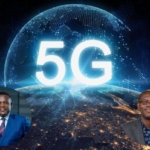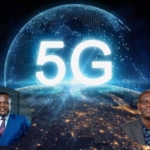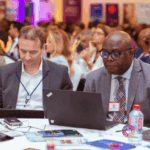
Bright Simons is widely recognised as one of Ghana’s insightful thinkers, known for thought-provoking commentary on national policy. In a recent article, he shared perspectives on Ghana’s exclusive 5G wholesale licence awarded to NextGen Infrastructure Company (NGIC). The discussion has sparked public interest in the broader rationale for Ghana’s 5G approach.
This article provides background context and information that may help readers better understand the policy direction, following the announcement by the Minister of Communication, Digital Technology and Innovations, Hon. Sam George, regarding the extended deadline for nationwide 5G rollout to Q4 this year.
Policy and Licensing
The Minister has indicated that the nationwide shared 5G network model is intended to address infrastructure challenges, encourage data cost reduction, and expand 5G access across the country. The exclusive wholesale licence granted to NGIC is one of the measures for implementing this policy approach.
Ghana’s 4G penetration is currently estimated at under 30% after several years of traditional licensing. A wholesale 5G model, coupled with neutral-host 4G arrangements, is expected to encourage broader digital inclusion.

Role of Tower Companies
Existing tower companies in Ghana manage passive infrastructure such as masts and power supply. A wholesale 5G network requires additional active components such as small cell deployments, fibre backhaul, and cloud-native network management. Globally, these are often developed by entities different from traditional tower operators.
Creating a New Wholesale Entity
The NGIC model represents a public-private partnership (PPP) between local stakeholders, international investors, and technical experts. According to official information, it has been designed to support advanced use cases such as network slicing, IoT, and other emerging technologies.
International Examples
Ghana’s 5G wholesale approach draws inspiration from other countries. Mexico’s Red Compartida was introduced as a wholesale network model to promote broader market participation. Rwanda’s wholesale LTE model (KTRN) has also been referenced internationally for its rapid coverage expansion.
Purpose of an Exclusive Licence
According to government statements, the wholesale licence is aimed at reducing duplication of infrastructure, ensuring open access for all retail operators, and promoting equitable coverage. The intention is to establish a regulated wholesale utility rather than a retail monopoly.
Market Context
Ghana’s telecom market includes operators with significant market share in various service areas. Officials have indicated that wholesale models may help address service distribution gaps between urban and rural areas, potentially supporting more inclusive connectivity.
Why This Matters
Reliable, affordable, and widely available internet access is central to Ghana’s digital economy ambitions. The 5G wholesale policy represents one of the strategies the government is pursuing to achieve nationwide coverage.
Debates such as the one initiated by Bright Simons highlight the importance of examining all aspects of major infrastructure policies. As the 5G rollout progresses, its outcomes will be closely watched by stakeholders across the telecom, technology, and development sectors.
- President Commissions 36.5 Million Dollars Hospital In The Tain District
- You Will Not Go Free For Killing An Hard Working MP – Akufo-Addo To MP’s Killer
- I Will Lead You To Victory – Ato Forson Assures NDC Supporters
Visit Our Social Media for More




